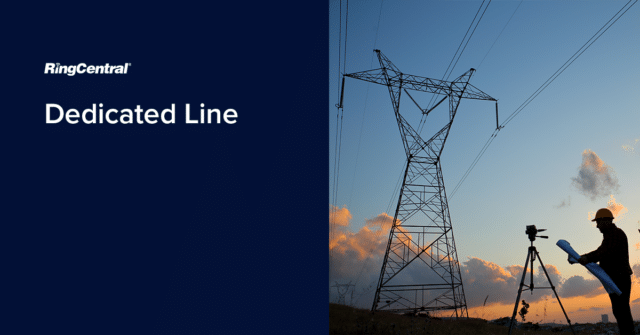What is a dedicated line?
A dedicated line is a fixed-bandwidth telecommunications pathway between two locations. It is a line that is reserved 24 hours a day by a single business subscriber and can allow for non-contested bandwidth for all users on that line.
As a dynamic business, dealing with the trials and tribulations of the public internet can be frustrating. With bandwidth fluctuating as consumers and businesses all competing for connectivity, business users suffer from latency, jitter, and some can’t function efficiently due to poor upload speeds. A dedicated line offers a simple, effective solution to these connectivity woes.
Often taking the form of a physical pathway owned by the business user or rented from an internet service provider, a dedicated line is also commonly called a leased line. However, unlike many common connectivity options, such as dial-up lines, a dedicated line (also commonly referred to as a non-switched line) is not shared with multiple users, meaning the connection is reliable and uninhibited multiple internet users.
Commonly taking the form of a fibre leased line, a dedicated line differs from standard broadband, fibre to the cabinet and ADSL connectivity where up to 50 other businesses might be sharing the line with you.
For small businesses, in particular, the jump from standard ADSL to a dedicated line can seem a big one. When it comes to pricing, investing in a dedicated line can seem a little daunting. Price, contract lengths and deployment times are often the key roadblocks for businesses considering a dedicated line. Unlike regular broadband, a dedicated line can take around three months to install, and monthly fees can set businesses back by around £150 per month (if not more).
However, a dedicated line can come with a whole host of benefits for your business. In this post, we explore general business use cases of a dedicated line and how it could significantly impact your business efficiency and resilience in the long run.

How is it used by the business?
With a dedicated line, it’s only one single business using that line. That means this solution is perfect for businesses looking for better stability and reliability for business applications like VoIP calls, EPOS payment systems and video conferencing.
A business will generally use a dedicated line to mitigate the challenges of a public internet connection. Some use leased lines to connect a bigger area in a bespoke area network design. This is called a Wide Area Network and is often used to connect businesses with multiple sites across different locations. Alternatively, a business might use a dedicated line to connect to a data centre or manage a VoIP telephone system using a more reliable connection.
Not only do businesses benefit from a better, uncontested bandwidth, but they also have the advantage of a guaranteed level of service in the form of an SLA (a service level agreement). A service level agreement is essentially an assurance from the provider, meaning you can ensure your dedicated line never goes down, or at least for 99.99% of the time. Most reputable providers offer a 99.99% uptime SLA or higher, and some even boast a 100% SLA. If your line drops to below the level agreed, having that SLA in place means that you could save money on your forthcoming bill.
If you’re considering investing in a dedicated line, be sure to shop around for the most reliable and highly regarded provider, with reasonable costs and coverage in your businesses local area.
What are the most common use cases for dedicated lines?
Before the days of the internet, the term ‘dedicated line’ was used to describe a permanent connection between two callers. At the time, this meant a physical phone cable between the two participants. Nowadays, a dedicated line describes any private network connection and is used primarily by businesses to connect two or more locations and support a more stable environment for everyday business applications.
These high-capacity solutions are mostly used to connect a corporate site to the internet.
A dedicated line is also commonly used to connect and carry call traffic or provide connectivity at business premises, which workers can connect to on-site, remotely, or home. Historically many companies used ISDN30 circuits to connect their business phone systems to the public network. These circuits can be costly, and many began looking for a new, and often more efficient way to carry call traffic. Using SIP trunking alongside a dedicated leased line, businesses can send and receive calls over a more economical, and less congested circuit.
These dedicated leased lines allow businesses to carry different traffic types, from general internet traffic and daily call volumes to emails, video streaming and WAN traffic, which carries data sent to and from one business site to another.
Another of the more common use cases of a dedicated line is to form a wide-area-network (WAN). A WAN is a selection of local networks or networks that communicate with one another, essentially a network of networks. Connecting the local area networks of disparate offices or business sites allows a corporation to transfer data with these other sites within the network efficiently.
What are the benefits of my business switching to dedicated lines?
In a modern working environment, high-speed internet has become indispensable. However, with so many connectivity solutions on the market, it can be hard to establish the unique advantages of each without extensive research.
Knowing your leased lines from your standard broadband is key if you’re considering investing in a better, more reliable internet connection. Whether your business model requires the use of online payment transactions, or simply several cloud-based software solutions, your internet connection forms the very foundation of your workforce productivity.
Many aspects can put businesses off the idea of investing in such an ‘exclusive’ option for their business WiFi. For most, it comes down to price. With business broadband costing as little as £20 per month, and dedicated leased lines starting at around £150, rising to £500 depending on your provider, the expense can be a massive barrier for many businesses with a limited budget for their connectivity requirements.
For some businesses, the installation time required for a dedicated line is also a roadblock. With deployment taking up to three months, businesses would need to invest in an alternative WiFi solution in the interim if they did not already have a contingency plan for that installation period.
However, despite the pitfalls, business leaders now know that connecting to the internet is increasingly important, especially in a world where public networks are becoming saturated with data traffic. With key criteria such as reliability, security and performance, modern businesses need a quick connection, supports better team productivity, and improves customer experience.
For this reason, many businesses are turning their back on the traditional public internet offerings provided by ISPs.
A dedicated leased line opens up new opportunities for businesses, with a host of advantages over the standard public connectivity options. Here are just a few of our top reasons to consider switching to a dedicated line.
-
Reliability
A dedicated line means fibre optic cabling running into your business premises. Not only does this have a massive impact on your internet speeds, but it also means your physical wiring is more robust than the alternative copper wiring. Stronger, and less prone to interferences, your dedicated fibre optic cabling is the first step in making your business operations run smoother and speedier.
A dedicated line means that your WiFi connection is unchallenged by other users. Exclusively used for you and your employees, your dedicated line will only be used to carry traffic relating to your business premises. That means you will see a much more consistent connection that doesn’t fluctuate during busy peak times.
-
Security
In addition to more dependable performance, a dedicated leased line can significantly reduce the strain on your IT resources in terms of your network’s security. In recent years there has been a significant rise in the number of cloud-based platforms used for day-to-day operations across every business department. One key concern with this is the security aspect.
Business leaders and IT managers are naturally concerned about controlling and ownership of data and information held by these external parties. While most cloud-hosting data centres boast exceptionally reliable security protocols, there is still a key concern around using public connections to security.
With a dedicated line, businesses have the assurance that data traffic remains totally private, allowing you to keep sensitive internal information separated from the public networks. In addition to this, a private network such as a WAN offers your business better protection of your network in terms of data leaks or cybercrime in general.
-
Dedicated support
Your investment in a dedicated line will come with a corresponding service level agreement, as we mentioned above. This agreement outlines any guarantees and maintenance pledges with regards to your dedicated line. When you invest in a dedicated line, you also invest in dedicated support for that internet connection, and usually an estimated fix time if the worst should happen. With downtime presenting a significant and costly threat to any modern business, having a dedicated, comprehensive SLA and dedicated support team gives real peace of mind in terms of your network’s resilience and robustness.
-
Increased speeds
Thanks to the fibre optic cabling we mentioned earlier, having your own dedicated line means you and your employees benefit from faster, uncontested bandwidth.
However, the key reason you’ll find your dedicated line seems so much speedier is because, unlike with public internet services, it offers a bandwidth capacity that is exclusively reserved for you and your employees. That also means the available bandwidth does not drop when customers with the same ISP browse, live and send information. Your frustrations over slow peak times will be a thing of the past.
According to OFCOM, the average ADSL connection allows around 12mbps downstream, with only 1mbps upstream. Commonly advertised speeds for a dedicated line are 10Mb, 20Mb and 100Mb. Not only will these connections be uncontested, but they are also symmetric, which means that the speed of data transfer downstream is the same upstream. For many businesses, the slow upload speeds of standard public internet cause frustration, particularly in peak times. With a dedicated line, employees can upload at the same pace as a download, helping them to become more efficient, and more productive in their daily tasks.
Who can benefit from a dedicated connection?
Slow speeds, downtime and interferences with your internet connection can completely stall your day-to-day operations, so it’s fair to say most businesses would benefit from a dedicated line. These common issues with public internet services can present unforeseen costs resulting from lost trade and lost productivity, so any business looking to improve their business continuity, efficiency and resilience might consider investing in a private leased line.
However, some types of business more commonly adopt a dedicated line for their internet needs.
1. Retailers or eCommerce businesses that require the customer to make payments online might opt for a dedicated connection. In this case, ensuring that the business can authorise these online payments is crucial and has an immediate impact on the bottom line, so minimising any downtime risk will be front of mind.
2. Multi-site businesses such as franchises, or those with different branch offices, shops or café and restaurant chains that need to send and receive information between different locations frequently might opt for a dedicated connection as part of a wide area network.
2. Virtual events businesses or those that deliver online training, conferences, meetings or webinars with customers regularly will be likely to consider investing to avoid embarrassing connectivity mishaps.
Customer experience is crucial perhaps now more so than ever, and ultimately, the efficiency of your business internet can significantly impact the journey your customers have at every touchpoint. For that reason, an increasing number of businesses (and those of all sizes and business models) are committing to progress their customer journey in this way. Switching to a dedicated connection means improving their employee experience and developing their overall business efficiency, underpinning long-term business growth and objectives.
Originally published Feb 08, 2021, updated May 20, 2021


